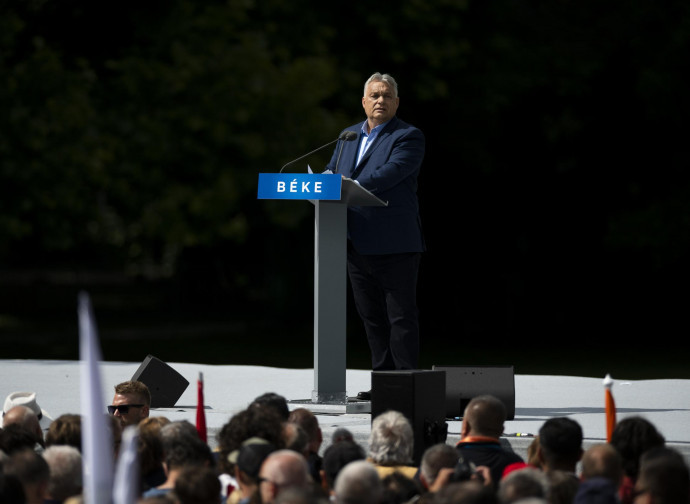Orban's European semester starts amid ferocious liberal attacks
From 1 July, Hungary assumes the six-month presidency of the European Council with a packed agenda. Many liberal socialists and pro-abortion corporations voice their opposition. Yet, support is rising as US and EU work to block its efforts.

Viktor Orban's Hungary, despite repeated attacks by the European Commission and on-going attempts by various liberal-socialist groups to prevent it, will take over the six-month presidency of the European Council soon (formally from 1 July) with a full programme of initiatives.
Among the topics to be addressed, besides immigration, will be competitiveness and reforms that protect national identities and competences, the right of ‘veto’ and unanimous voting; strong initiatives for the enlargement of the Union to the Western Balkan countries (Bosnia, Serbia, Albania, North Macedonia) and in favour of pro-birth policies that address the demographic winter across the continent will also be contemplated. On this particular emergency back in 2023, the European Council, on the initiative of the Polish and Hungarian governments, had asked the European Commission to draw up a proposal to address demographic challenges, in particular their impact on competitiveness.
The proposal that was subsequently adopted by the European Commission in October 2023, although generic, covered four fronts: the first to facilitate the reconciliation of family life and work for families with children and to make quality childcare services more accessible; the second, on improving the labour market situation and the life chances of young people by developing their skills; the third, on preserving the well-being of older age groups; and finally the fourth to stimulate both the labour market participation of young talent and the training, integration and hiring of legal immigrants.
Since the outgoing Commission achieved nothing, all these proposals and demographic tools will have to be developed during the Hungarian EU presidency, which should address demographic issues and the effects on competitiveness at EU level as one of its priorities, as has been reiterated in recent months.
It doesn’t take much to imagine how much the Hungarian Presidency’s priority for the coming six months irritates the many multinational associations and corporations that inside and outside the European institutions have promoted, even in the last parliamentary term, the right to kill the innocent also up to birth, as a ‘human’ and constitutional right for the future Europe. All of this makes Orban and his government indigestible to the Euro-Atlantic liberal-socialist powers, who are even less sympathetic to him due to his broad electoral consensus, his stubborn pacifist stance, and his desire to become a hinge between certain right-wingers and European conservatives.
Despite the efforts of Brussels and Washington to push the Hungarian oppositions against Victor Orban, the polls for the upcoming European elections see the governing parties at 48% support, the new leader Péter Magyar and his right-wing identity party ‘Tisza’ (Respect and Freedom Party) at 25%, the coalition of Socialists (DK-MSZP-Dialogue Alliance) at 8% and the Soros-backed party ‘Momentum’ at 1%. With this in mind, to the greatest disappointment of the European centrists, Orban is also playing an important role at the European level in bringing together the political priorities and interests of Giorgia Meloni's Conservatives and the Identitarians and Democrats led by Marine Le Pen. A foreseeable political operation and whose positive effects will be appreciated precisely during the six-month Hungarian European presidency.
Finally, the many liberal-socialist politicians who push for Europe's war against Russia, French President Macron, NATO Secretary General and former Norwegian Labour leaderStoltenberg, European Foreign Policy High Representative and former Spanish socialist minister Borrell, while threatening Orban and Hungary to slim down the portfolio of its next European commissioner, are forced to take note of the popularity of the current Hungarian prime minister. Indeed, on Saturday 1 June, in front of tens and tens of thousands of people who had flocked to Budapest to demonstrate for peace in Europe, Orban recalled the need to ‘send our candidates to Brussels, people who do not believe in war and violence...while Europe prepares for war’, and indicated another political priority for 2024: the creation of a coalition for peace throughout Europe and the transatlantic region.
Brussels' war against Hungary and Poland. And against common sense
Hungary confirms confidence in Orban and re-elects him. And Brussels is ready to retaliate: no Recovery funds, frozen in the name of respect for the rule of law. This is an expected and predictable response, but it shows how much the EU has become a super-state that punishes or rewards, depending on the loyalty of its members to "its" values. And even the Recovery for Poland is still pending, awaiting approval, because Brussels is demanding that the government dismantle its justice reform. Despite Poland taking in millions of war refugees from Ukraine, Brussels continues to fight its own internal war.
Europe asks us to ration our gas. The (un)happy degrowth is here
Reducing gas demand by 15% from 1 August 2022 to 31 March 2023, with possible exceptions of 7% cuts up to exemption. After the imposition of sanctions on Russia and the reduction of the gas flow from the East, Europe is moving towards “energy degrowth in solidarity”, especially towards Germany, which suffers most from the Russian gas cut. Member states must update their energy plans and report to the Commission every two months. Meanwhile, we will be more dependent on liquefied gas from the US. As well as on solar panels produced in China. The environmentalists of Fridays for Future are not satisfied with this and are threatening all-out occupation of schools, to “end the fossil economy internationally”.
Poland is right, democracy in Europe is at stake
The clash over national sovereignty between Poland and the European Union raises the fundamental question: Should the process of European integration result in the creation of a supranational entity that is above the individual Member States, or should these states retain their sovereignty and transfer only part of it to Brussels? This is the statement made by the former president of the Czech Republic Václav Klaus on the subject.

